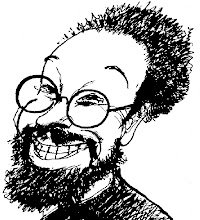I've had a copy of Essays of E.B. White on my shelf for years, product of a foray into some secondhand bookstore or a gift (the price tag was clipped) from someone I don't remember. The other night, a week into a cold that turned into bronchitis and four days spent mostly in bed, I took it down.
Of course, I'd read Charlotte's Web and Stuart Little to my son. The Elements of Style, which White revised and edited from a book self-published by one of his college English teachers, has bee on my writing desk for years. Yet, though I'd known White wrote for the New Yorker for some 60 years and was aware of his reputation as an essayist, somehow I'd managed never to read any of them.
It's enough to say that over the last few says I've been making up for lost time. The picture of White on the dustjacket shows a man with thinning white hair and a sparse mustache. Though he stands outside in the snow, he wears only a tweed jacket. He looks straight at the camera, honest, inquisitive, straightforward.
Which sums up his essays. They're leisurely paced without being boring, erudite, witty, and charming, entertaining without being frivolous. One of the strengths of his prose is its authority, something too many of today's writers confuse with snarkiness. White is never that, though from time to time, he allows himself a sentence like, "And if the surf hath lost its savor, wherewith shall we be surfeited?," on why he quit going to a certain Florida beach after the sand dunes were leveled.
I know nothing about how White actually wrote, whether he used pen, pencil, or typewriter. Something about the prose makes me think he used a typewriter, an old portable manual typewriter of the kind foreign correspondents used to carry in the movies. The prose has the thought-out rhythms of the pre-computer age, each word burnished and its place in the sentence ruminated upon before the fingers touched the keys to deliver the finality of black ink on white paper.
It's always dangerous to speculate about what writers were like, but White seems a decent man in his picture, an impression sustained by "Bedfellows," the essay I finished before bed last night. In it, White remembers Fred, a long-gone dachshund, and muses on two articles and a book by three Democratic politicians. "I take Democrats to bed with me for lack of a dachshund," he explains, "although as a matter of fact on occasions like this I am almost certain to be visited by the ghost of Fred, my dash-hound everlasting, dead these many years."
"Bedfellows" was written in 1956, but it could have been written yesterday. White skeptically reports Truman's complaints that the "Republican-controlled press" was hostile to his 1948 candidacy, lied about the facts, and refused to report on his campaign. He muses about Cold War "loyalty-security procedures," and he balefully contemplates a statement by then-president Eisenhower (there's also a Republican in the bed) that "most Americans are motivated . . . by religious faith" because of the implication that "religious faith is a condition . . . of the democratic life."
"This," White concludes, "is just wrong," continuing, "I distrust the slightest hint of a standard for political rectitude, knowing that it will open the way for persons in authority to set arbitrary standards of human behavior."
Like George Orwell's "Politics and the English Language," this is one of those essays I'd like to send to certain persons in authority.
Wednesday, May 26, 2010
Subscribe to:
Post Comments (Atom)

No comments:
Post a Comment